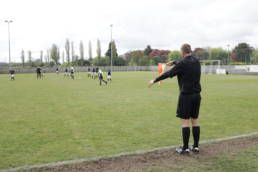One of the biggest changes to the laws of grassroots football in recent years is here. Make sure you’re clued up on the new temporary dismissal (AKA ‘sin bins’) rules and how it will affect your club.
In this article we’ll tell you why it has been introduced, what it will entail and give you some perspectives from different viewpoints within the game.
Why are Sin Bins Happening?
There probably aren’t many people who would disagree that dissent is something that needs to be stamped out of the game. We see it at every level from Premier League to Sunday League. It’s even starting to infiltrate youth football a lot more than it used to. There’s no wonder referee numbers are dwindling as they ponder “is it really worth the abuse?” For many in recent years the answer to that question has been “no”. We’ve all seen the stories of grassroots referees quitting the game after the abuse and in some cases even assaults became too much.
This is clearly not sustainable. The simple fact is that without the men in black, we have no game. So what is the FA doing about it? The Respect programme has been running since 2008 as a general code of conduct to create a better environment for all involved. The ‘We Only Do Positive’ campaign was launched this year to help create a more positive experience for those involved in junior football, mainly targeting coaches and parents.
The biggest and most practical step taken in order to stamp out dissent is the introduction of Temporary Dismissals, better known as Sin Bins. This follows a successful two year trial period which saw 31 leagues taking part in 2017/18 and 61 in 2018/19 across the country. Within the leagues taking part there was a 38% reduction in dissent related offences. There was overwhelming support for the trial, with 72% of players, 77% of coaches and 84% of referees all concluding that they wanted to continue with sin bins.
How Will Sin Bins Work?
It has since been announced by the FA that sin bins will be rolled out mandatorily across all leagues from step 7 and below from the start of the 2019/20 season. But how will sin binning actually work?
- Only to be used for offences of dissent.
- Only used for players on the field of play, not substitutes or team officials.
- The referee will indicate a sin bin by showing a yellow card before using both arms to point towards the side of the pitch.
- The length of the sin bin is 10 minutes for adult football and 8 minutes for youth football.
- The period begins when play is restarted. When the period is over, the player returns to the pitch when allowed to do so by the referee. This can be during open play.
- A sin binned player cannot be substituted until the dismissal period is over.
- If a player is sin binned shortly before half time, they will remain dismissed at the start of the second half, until the period is completed.
- If a player is sin binned at the end of extra time, they are permitted to take part in a penalty shootout.
- Any dismissal period unserved at the end of the match is lost and not carried over to the next match.
- The player should stay in the technical area during their dismissal, or where there is no technical area, with their team’s coaching staff.
- If a player receives a 2nd sin bin in the same match, they shall serve their temporary dismissal before taking no further part in the match. At the end of the period, if their team has a substitution remaining, then they may be replaced.
- If a player who has been sin binned receives a yellow card later in the game, then they can continue (and vice versa).
The County FA View
We spoke to Tim Lawrence, who is Referee Development Officer for Surrey County FA, about the new rule. We wanted to find out more about the ways in which they hope it will benefit grassroots football going forward.
“We believe that the new rules will benefit the match day experience for all of those involved. One of our youth leagues trialled it with great success and dissent towards match officials has been greatly reduced.
During the 2018/19 season, sin bins were also used in three of our County Cup competitions and very few players were sin binned because they were aware of the consequences of showing dissent.
We are delivering face to face training via workshops to leagues and referee societies. The FA will also be producing an online learning platform for sin bins so that everyone can access the training.
The overall feeling has been very positive, especially from those who have attended the training. The workshops have been able to allay any fears that they might have had over how to implement the sin bin sanction.
The officials involved in the trials have also responded very positively and have been helping to educate their other colleagues.”

The Refs View
To get a perspective from the one of the people who will be implementing the sin bin rule this season, we spoke to up and coming Manchester FA referee Will Davis…
“I expect the introduction of Sin Bins to reduce the overall level of dissent in the game as there is now a more effective sanction in place to deal with it. Dissent creates a negative atmosphere that impacts everyone including players and coaches – not just referees. I hope that it means players will be more likely to get on with playing the game which is all referees want.
I haven’t been involved in any games that were part of the trial, but I know that it was very extensive and included over 135,000 games nationally. The results have been very positive and show that there has been a 38% reduction in dissent within those games. If we see that next season then it will be a definite success.
Both The FA and County FA’s have been delivering extensive training around sin bins that has included referees, leagues, coaches and players. As this is such a big change, it’s important that everyone understands it and works together to implement it correctly. This is a clear priority area for The FA for the next few months so I am sure there will be even more publicity given to sin bins.
I think anything that helps Referees is welcome, particularly if it has the knock on effect of everyone enjoying their involvement in football more. It’s bound to be a work in progress but I think it’s only right that we try to improve in any way we can. That’s been the response I have had from other officials I have discussed it with, too. There is bound to be some scepticism initially but I believe that eventually it will have the desired effect and become the norm.
The professional game is very different so it’s hard to say whether it should be expanded higher up the pyramid. The focus is on making it a success within grassroots football this year and then you never know.”
We previously spoke to Will about his road to becoming a fully qualified referee. Read more here.

The View from the Clubs
It will certainly take some time for the men in black to get used to using the new rule. But it’s not only officials that need to adapt, its coaches and players too. To get the view from those who will be on the other end of the sin bins (well, hopefully not), we asked manager of Swarthmoor Social FC, Arron Aston.
“I do think that it’s a massive shame that Referees are quitting the game in such high numbers. Players do take them for granted, especially at amateur level. They don’t turn up to work in their own time to be abused for 90 minutes and I do hope that this ends and the numbers of referees at this level increases. For too long now have fixtures in the lower end of our amateur league system taken place with no referee present.
I definitely agree that something should be done to help referees but my main problem with the new rule is the timing of the ten minutes. I fear it will be treated like added on time and just estimated. The new ruling states that the ten minutes only lasts for when the ball is in play. This could be confusing should a referee be faced with having 2+ players sin binned at any one time.
It’s understandable that with the demanding, fast action of the game that a referee will be more likely to simply just use a block of ten minutes regardless of where the ball is during that period.
If the rules are adhered to and referees add on any time lost over that 10 minutes don’t be surprised if you see a player getting sin binned with 15 minutes to go and the opposing side, who are benefitting from being a player up, start slowing the clock down to turn ten minutes into fifteen, therefore effectively sending that player off for the rest of the game.
The only way that we will see if it works is at the end of the season. Reports suggest the trial periods in other leagues have proved a success. I know the lads in my team don’t like to be subbed off. If they find themselves sin binned then they’ve let the side down for 10 minutes and there isn’t anything they can do to change it until they are back on, hopefully this will make them think about their future conduct.”
Let Us Know Your Thoughts on Sin Bins
It seems that most are largely supportive of the new rule even despite some points of doubt on a few of the finer details. While some are understandably reserving their judgement until they see the new rules in action. If the success of the trials over the last couple of years is anything to go by then any scepticism should be dismissed in the early months of the season.
Don’t be shy, let us know what you think about the new rule. Were you part of the trial period and did you think it was a success? What else could be done to create a more positive environment in grassroots football?
Drop us a comment below or get in touch on our socials to start the debate!
How useful was this post?
Average rating 4.4 / 5. Vote count: 14
No votes so far! Be the first to rate this post.
